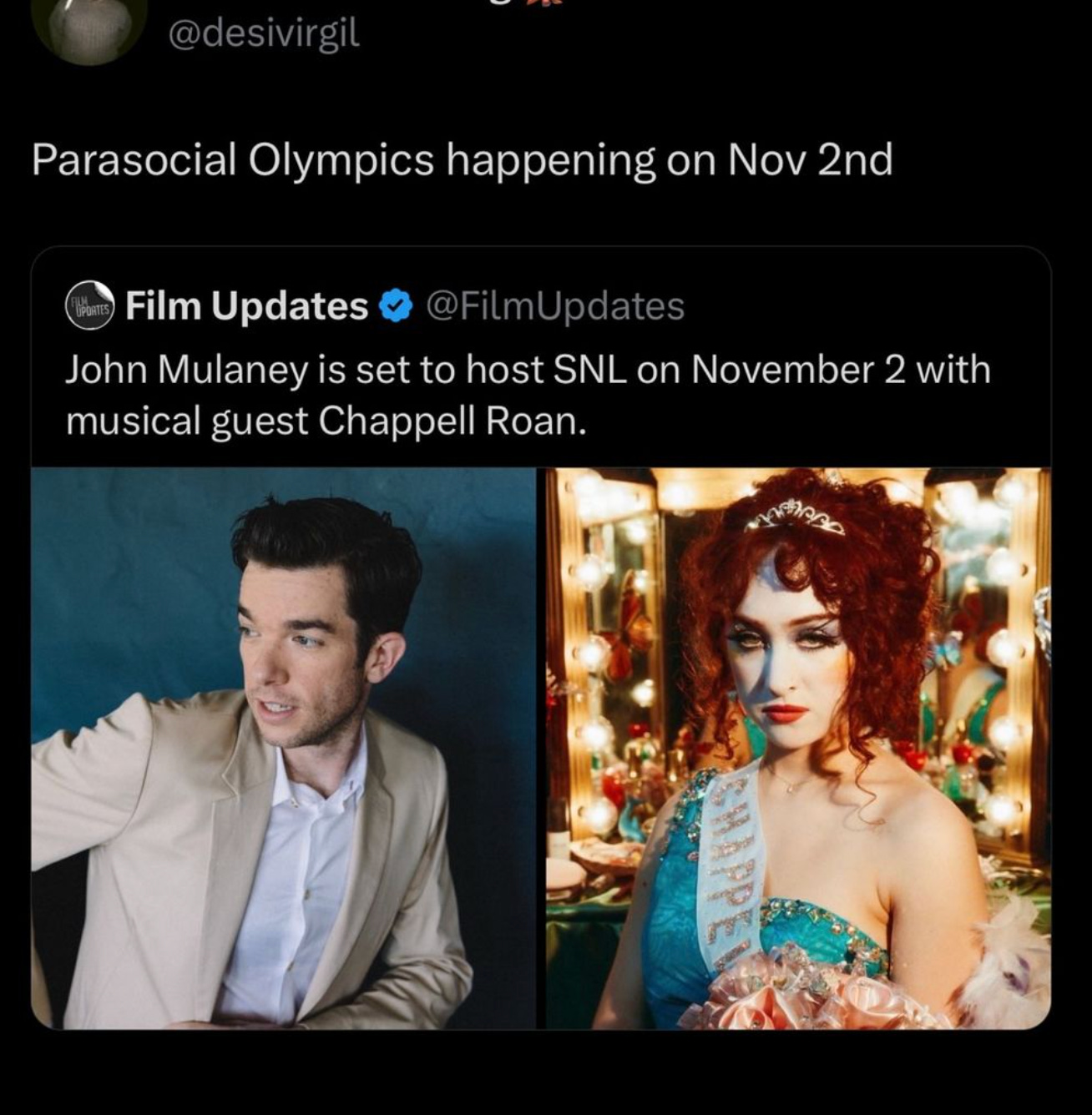What are parasocial relationships?
You love them, but do they love you back – or even know who you are?
Welcome to Gen Z Translator, where I break down trending topics on Fridays. If you’re new, you can subscribe here and follow me on Threads or X. Views are my own. Happy reading!
I want you to think of your favorite celebrity.
Why do you like them? Do they have a big social media presence? Are they descriptive in interviews? Do you enjoy the characters they play or the music they make? Do you feel like you know them so well you could be friends?
Better yet, do you feel like you are friends with them?
This might be an indicator you have a parasocial relationship with them. It’s a buzzword going around, so I thought I’d take some time to explain what it means.
Returning for its 50th season, Saturday Night Live poked fun of the concept in a skit where Moo Deng, a baby hippo made famous by memes, mirrored Chappell Roan’s concerns about respecting boundaries.
“When I’m in my enclosure tripping over stuff, biting my trainers knee, I am at work,” SNL cast member Bowen Yang said while in character. “Do not yell my name or expect a photo just because I’m your parasocial bestie or because you appreciate my talent.”
Ariana Grande mentioned the term in a lie detector test interview with Vanity Fair, describing her relationships with fans as “weirdly parasocial, but it feels very real to me.”
I’ve defined it in the past as “one-sided relationship where one party feels like they deeply know the other, going so far as to consider themselves friends when they’re not.” Fandoms1 thrive off this concept.
British YouTuber Dan Howell has raised awareness about this phenomenon for years. His strong fanbase and deep-seated digital footprint has lead to next-level intrusion into his personal life. He defined it as “a relationship that a person imagines having with another person whom they do not actually know, such as a celebrity or fictional character.”
“The internet is weird,” Dan said in an explainer video. “We feel like we know people but we don’t except we kind of really do, but it’s not real.”
Parasocial relationships are fun. Period. If they weren’t, fans would waste the time and energy doting on someone who will never know they exist. Dan Howell said “it’s comforting to feel part of an online community and just enjoy someone’s entertainment.”
It’s fun to be a little delulu2, to live in your daydreams, to ignore it’s a real person on the other side of the screen. You see it with Timothée Chalamet. You see it with just about every major celebrity. Fictional ones, too. (Look, I’m guilty as charged).
There are pros, and there are cons. You can argue, “The fans aren’t hurting anybody,” until they do. You can argue, “The celebrities aren’t taking advantage of anybody,” until they are.
“At its worst, a parasocial relationship can lead to stalking…jealousy-fueled attacks, feelings of personal betrayal when that person with a full life of your own doesn’t do what you expected,” Dan said. “But consumers of the content can also be exploited.”
Musician Eliza McLamb wrote about her own experiences with fame and parasocial-ism (that’s a word, right? We’re making that a word) in a beautiful Substack piece:
“I am both overly present and overly absent; I am everywhere, inundating the audience with content and yet cannot promise them genuine access to me as a person. It goes the same way with the audience, who is perpetually engaging with the version of myself I reproduce for the internet, but not my true, authentic self. Nobody is quite touching. It is everywhere and nowhere.” -Eliza McLamb, “The Eeriness of Fame”
“Parasocial” currently doesn’t have a definition in the Merriam-Webster dictionary. (Meanwhile, the dictionary is adding words *cough* phrases like “FYP3,” “nepo baby,4” and “touch grass,5” but let’s not talk about that yet).
I think this goes to show society still doesn’t quite grasp the concept or see a need for better establishing boundaries between real life and virtual life. As the two become more and more intertwined, unfathomable internet fame occurring overnight, parasocial relationships are only going to get worse.
Bring in virtual reality, artificial intelligence, and deep fakes, and you start to get into really murky territory.
Will we be able to interact with an AI-version of our favorite celebrities one day? (Think Ana de Armas in Blade Runner 2049 or Scarlett Johansson in Her). What happens, then, when we’re presented with real-life opportunities with said celebrity, like concerts, meet-and-greets, and accidental run-ins? Will our comfort level match their comfort level, or will fans feel emboldened to treat them the same way they do in the privacy of their own home?
Without more awareness, parasocial relationships are encouraged. It’s seen as another form of fangirl culture or pop culture obsession sensationalism. Go off, bestie, you say as your friend gushes about that boy band. “Play next,” you say to yourself as you watch the tenth video in a row of your favorite YouTuber.
Harmless, really. For now.
Read my last social media story: Ratios are stupid
My weekly roundup:
🎶 What I’m Listening To: “Ghoul” by Rainbow Kitten Surprise
🎞️ What I’m Watching: The Circle, Season 7
📱 What I’m Scrolling: Anna Delvey may have been kicked off Dancing with the Stars, but she still hasn’t been kicked out of the country
⚠️ What’s On My Radar: Heartstopper Season 3!
Read the full Gen Z Dictionary here.
Fandoms: A predominantly online group of fans
Delulu: Short for “delusional”
FYP: For You Page, recommended content tailored to you on social media platforms
Nepo baby: Someone benefiting from nepotism, usually a child of a famous person
Touch grass: Said as encouragement to get off your computer/out of your house to take a mental break from the internet






